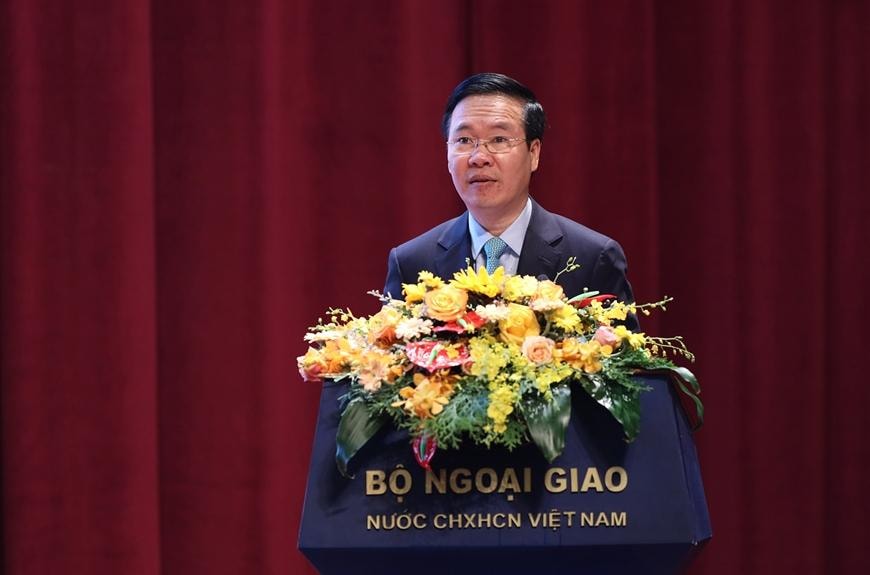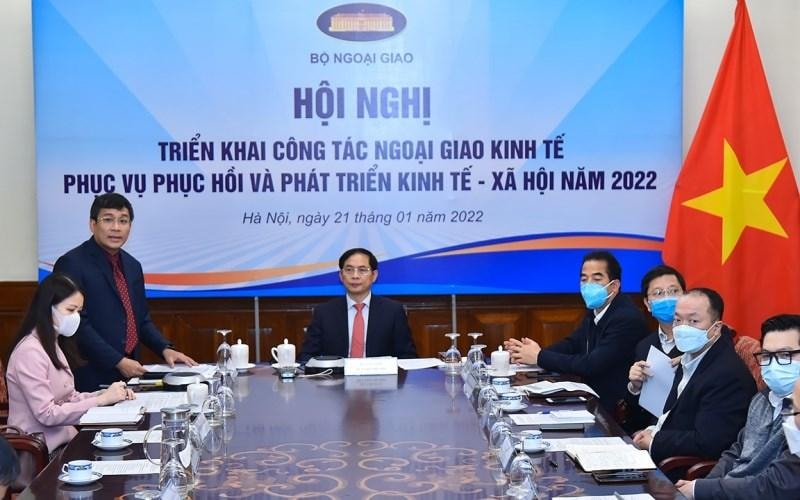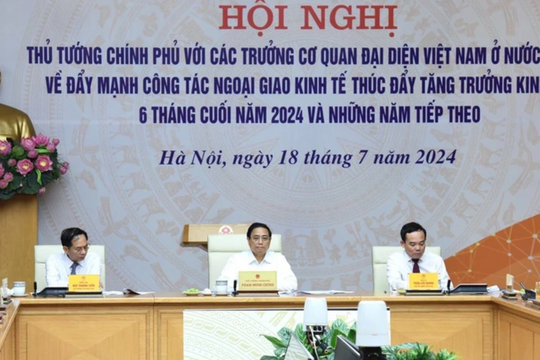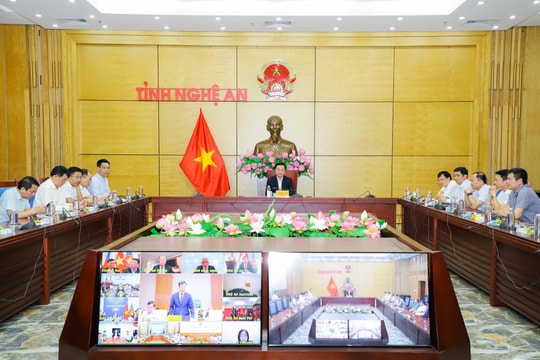Directive of the Secretariat on economic diplomacy to serve national development until 2030
Standing member of the Secretariat Vo Van Thuong has just signed and issued Directive No. 15-CT/TW of the Secretariat on economic diplomacy to serve the country's development until 2030.
 | |
|
After 12 years of implementing Directive No. 41-CT/TW, dated April 15, 2010 of the Secretariat of the 10th tenure, economic diplomacy has had strong changes, making important contributions to the country's socio-economic development achievements. However, the awareness of all levels and sectors about the position, role and importance of economic diplomacy is not adequate; economic diplomacy has not kept up with the situation and requirements of national development, and has not been closely linked with diplomacy on national defense, security, culture and society to create a comprehensive strength. Economic relations with a number of important partners still face many difficulties and obstacles, intertwined interests have not been truly profound and have not promoted real effectiveness; external resources have not been linked with domestic resources. Research, forecasting and strategic advice on economic diplomacy have not kept up with the requirements of the task at times and in some places. Support for sectors, localities and enterprises in foreign economic relations and international economic integration is still inadequate and ineffective.
 |
| Online conference to deploy economic diplomacy to serve socio-economic recovery and development in 2022. Illustration photo: Ministry of Foreign Affairs |
To successfully implement the goals, orientations for socio-economic development and foreign policy set out in the Resolution of the 13th National Party Congress; to comprehensively and substantially improve the quality and effectiveness of economic diplomacy in the new development stage of the country, the Secretariat requests Party committees at all levels, Party organizations, the Fatherland Front and socio-political organizations to focus on leading and directing the good implementation of the following tasks:
1. Correctly, fully and deeply understand the position, role and importance of economic diplomacy. Identify economic diplomacy as a fundamental and central task of Vietnamese diplomacy, an important driving force for rapid and sustainable national development; play a pioneering role in mobilizing external resources, contributing to promoting industrialization and modernization, enhancing the potential, competitiveness and adaptability of the economy, building an independent, self-reliant, proactive economy, actively integrating comprehensively, deeply and effectively into the international community. In leading and directing economic diplomacy, it is necessary to clearly identify the focus and key points, taking national and ethnic interests and real effectiveness as the top criteria in implementing economic diplomacy activities.
2. Continue to expand and deepen relations and create a position of intertwining economic interests with partners. With important partners, especially neighboring countries, strategic partners and comprehensive partners, we must proactively and actively create and perfect cooperation frameworks, closely linking political and foreign relations with economic, defense, security, cultural, educational and scientific-technological cooperation... Make the most of foreign political relations to promote economic cooperation and linkages, thereby firmly consolidating relations with partners, enhancing the country's potential, position and prestige. Resolving difficulties in economic relations with partners must ensure the highest national interests, in harmony with the legitimate and legal interests of partners. Elevate multilateral diplomacy, proactively participate and promote Vietnam's initiatives in international economic mechanisms and forums and international issues of strategic importance, in accordance with our specific requirements, capabilities and conditions. Proactively contribute to the reform process, improve the effectiveness of global economic governance organizations; build and perfect international economic institutions.
3. Improve the quality and effectiveness of international economic integration, contributing to the implementation of the Socio-Economic Development Strategy 2021 - 2030. Implement and effectively utilize free trade agreements, proactively handle complex issues arising in the process of implementing commitments, minimize damage, and maintain political and social stability. Selectively participate in international economic linkages; negotiate and sign free trade agreements in line with our priorities and interests. Actively mobilize, attract, and selectively cooperate with foreign investment. Proactively expand and deepen scientific and technological cooperation, attract external resources for research, application, transfer and technology development; establish research and development centers, innovation, train high-quality human resources, develop creative startup ecosystems, and effectively participate in the global innovation network. Continue to multilateralize and diversify markets and partners, avoid dependence on one market or one partner; proactively and actively participate and firmly consolidate Vietnam's position in the global supply chain on the basis of meeting sustainable development criteria. Build and perfect policies, laws, management mechanisms, improve the effectiveness of Vietnam's aid provided to foreign countries, ensure consistency, transparency, practicality, and suitability with the country's potential, serve security and development interests and enhance the country's position and prestige. Encourage and create conditions for overseas Vietnamese to actively contribute to the cause of national construction and defense. Continue to perfect the legal system, reform administrative procedures and synchronously implement policies related to overseas Vietnamese when returning to work and reside in the country; create favorable conditions for overseas Vietnamese to return to invest, produce and do business.
4. Building economic diplomacy for development, focusing on people and businesses. Encouraging the proactive and active participation of localities, businesses and people in economic diplomacy activities. Focusing on supporting sectors, localities and businesses to effectively exploit international markets, access capital sources associated with high technology, effectively participate in regional and global value chains and production. Perfecting the defense system to protect the domestic economy, businesses and markets in accordance with international commitments and laws. Continuing to innovate, diversify methods, and promote the role of Vietnamese representative agencies abroad to improve the effectiveness of trade and investment promotion. Strengthening the role and responsibility of foreign affairs agencies in appraising and handling difficulties in important projects with foreign elements or sensitive to foreign affairs.
5. Strengthen monitoring, grasping, timely and effective updating of information and the world economic situation; improve the capacity for forecasting and strategic advice on international economics. Further promote research and summarize development experiences of other countries, international economic laws and practices, and be sensitive to detecting new trends and development models. Actively expand the network and improve the effectiveness of cooperation with reputable international economic research and consulting organizations to have accurate and quality information sources to serve research, advice and strategic forecasting on economics. Ministries, branches and localities need to connect and exchange information with people and businesses to deploy practical and effective economic diplomacy activities, best meeting the requirements of socio-economic development and ensuring national defense and security.
6. Strengthen close and effective coordination, further promote the role of Party diplomacy, State diplomacy and people's diplomacy at multilateral economic forums. Enhance foreign relations with political parties, ruling parties, and people's organizations of other countries, contributing to promoting bilateral relations and facilitating economic diplomacy. Improve the effectiveness of inter-sectoral coordination mechanisms in foreign affairs and international integration, between economic diplomacy and cultural diplomacy, defense and security; between bilateral and multilateral; between agencies in the political system, sectors, localities and enterprises in implementing economic diplomacy.
Strengthening training and fostering for cadres and employees working in foreign affairs and economic diplomacy at all levels, sectors, localities and enterprises in ethics, political capacity, knowledge, capacity, qualifications and skills in economic diplomacy, international economics, international law and international economic integration... Allocating and effectively using resources to meet the requirements of promoting economic diplomacy in the new situation, ensuring practicality, effectiveness and suitability to the characteristics of economic diplomacy.
7. Provincial and municipal Party Committees, Party committees, Party executive committees, Party delegations, and Party committees directly under the Central Committee shall organize research, study, and dissemination of the Directive to cadres, Party members, people, and enterprises; lead and direct the implementation of the Directive within the scope of assigned functions and tasks.
The National Assembly Party Delegation and the Government Party Committee lead and direct the development and improvement of mechanisms, policies and laws; and improve the effectiveness and efficiency of State management of economic diplomacy activities.
The Party Committee of the Ministry of Foreign Affairs shall preside over and coordinate with the Party Committees of relevant ministries, branches and agencies to develop and implement economic diplomacy plans in each period; preside over and coordinate with the Central Foreign Affairs Commission and relevant agencies to monitor, guide, urge and inspect the implementation of this Directive, and periodically report to the Secretariat.

.jpg)


